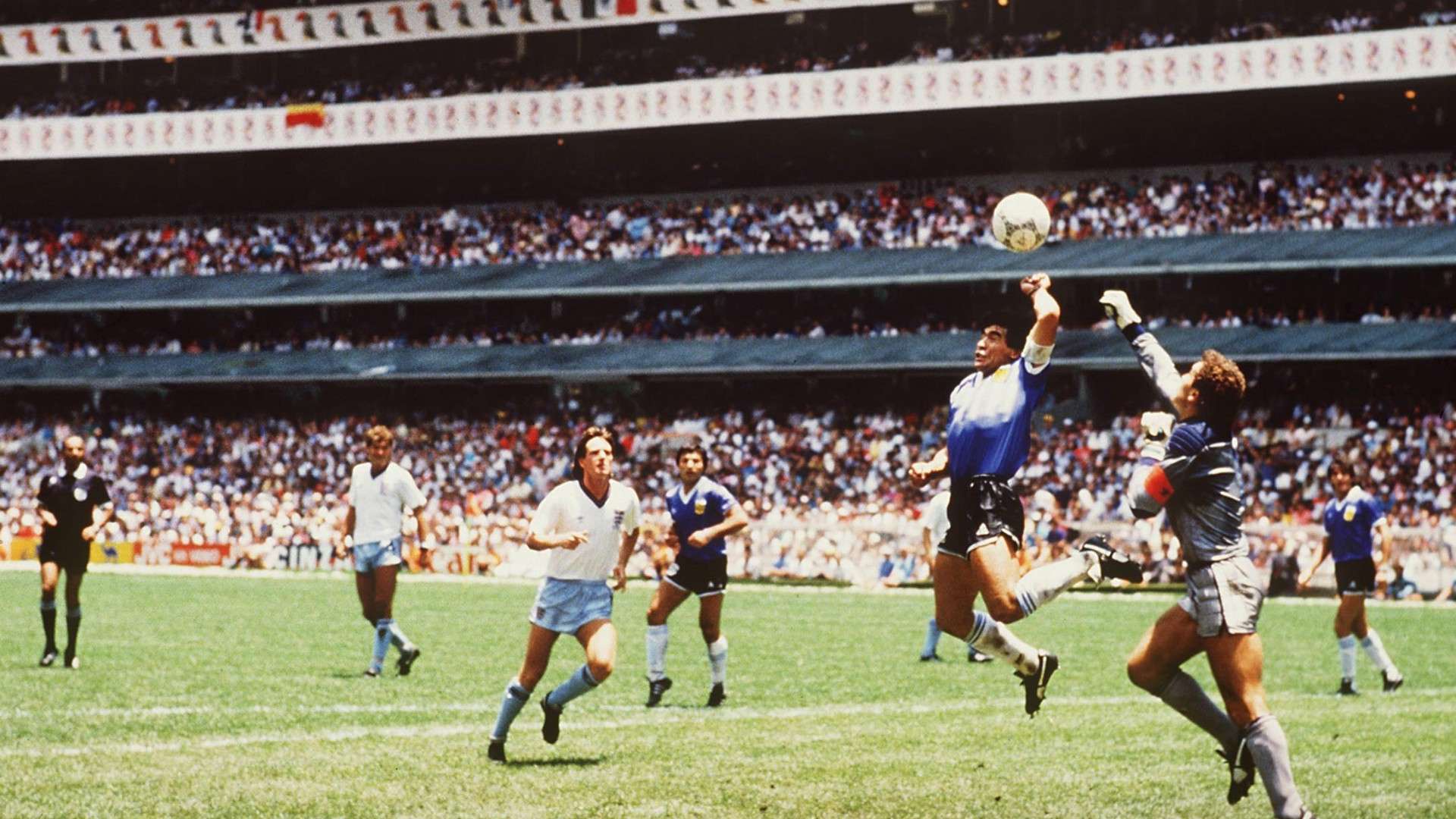There have been few games in World Cup - and indeed football - history that have left more of a lasting impact on the sport than Argentina's victory over England in the 1986 quarter-finals in Mexico City.
Played at the famous Estadio Azteca, the match was taken over by the greatest player on the planet at the time - and, for some, of all time - in Argentina's captain and No.10, Diego Maradona.
But while Maradona's second goal of the game encapsulated his brilliance perhaps better than any other he scored in his career, his first was an equally perfect example of his ability to create controversy and divide opinion.
We are talking, of course, about the 'Hand of God', as Maradona dubbed the opening goal himself after punching an aerial ball past England goalkeeper Peter Shilton. It was and still is the most astonishing moment in the rivalry between England and Argentina that continues to this day.
Diego Maradona in 1986
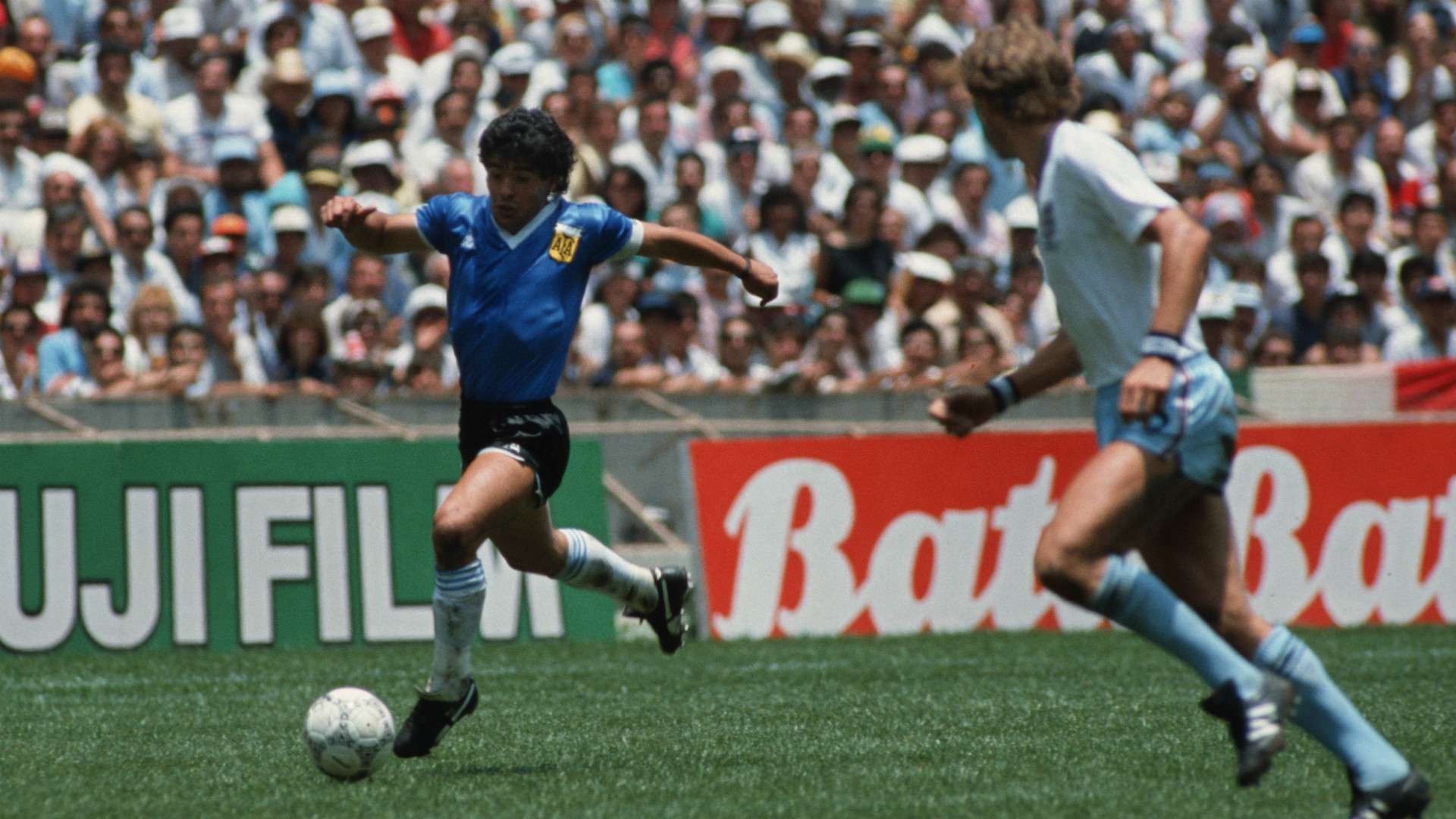 Getty Images
Getty ImagesMaradona was 25 years old and entering the prime of his career when the 1986 World Cup came around. He had broken the world transfer record for the second time by joining Napoli from Barcelona for £6.9 million in 1984, and helped the Serie A side finish eighth and then third after they had narrowly avoided relegation the season before he signed. The next campaign, immediately after the World Cup, they won the Scudetto for the first time in their history and added the Coppa Italia for good measure.
After making his name at Argentinos Juniors with a sensational goalscoring record, Maradona joined Boca Juniors in 1981 and won his only Argentine league title. From there he was quickly snapped up by Barcelona, where he was exceptional when fit but suffered from hepatitis and then a broken ankle as a result of a challenge by the notoriously vicious defender Andoni Goikoetxea. Barca met Goikoetxea's Athletic Club in the 1984 Copa del Rey final and after being the subject of violent play and xenophobic insults from the crowd throughout the game, Maradona sparked a mass brawl that effectively ended his career at Camp Nou - not that he was especially reluctant to leave.
He was in a much better place when the World Cup in Mexico came around, with Naples the perfect fit for Maradona the person as well as the player. Having been knocked out by Italy and Brazil in the second round of the 1982 tournament after being fouled a World Cup-record 23 times against the Italians, Maradona also had something to prove.
Argentina vs England, World Cup 1986
Date | June 22, 1986 |
Venue | Estadio Azteca, Mexico City |
Attendance | 114,580 |
Final score | Argentina 2-1 England |
England had finished second in their group and beaten Paraguay in the round of 16 to qualify for the quarter-finals, while Argentina were unbeaten and had seen off Uruguay to book their place in the last eight. Having already built up a footballing rivalry, four years earlier the two countries had been at war for the Falkland Islands.
That added plenty of extra tension to what was always likely to be a fiery game on June 22, 1986. Maradona lined up behind Jorge Valdano in Argentina's 3-5-1-1 formation, while England played a fairly narrow 4-4-2 with Steve Hodge and Trevor Steven furthest wide in the midfield.
The first half passed without any goals, but though Peter Beardsley had a good chance for England it was Argentina who enjoyed more of the ball and were asking more questions in the attacking third. Their superiority would tell early in the second half in two of the most famous moments, for very different reasons, in the history of the World Cup.
Even the Hand of God, though, started with a bit of Maradona brilliance. The No.10 skipped past Glenn Hoddle and then squeezed in between two more England players before sliding a pass out to Valdano and making his way into the box. The ball skipped up on Valdano's foot and Hodge wildly hooked it into his own penalty area, where Maradona rose and punched the ball past the onrushing Shilton.
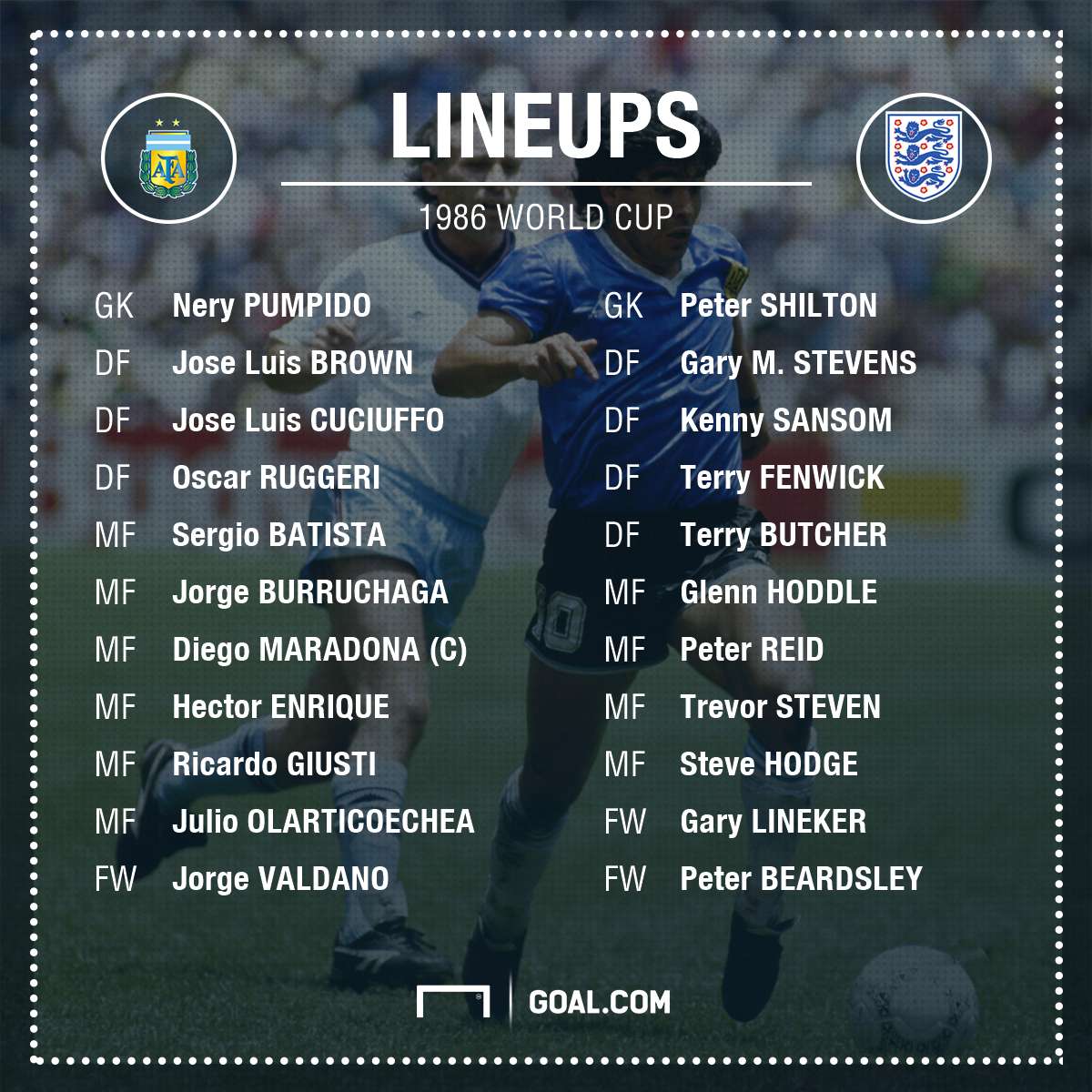
None of the officials spotted it - and so did no one else, for a while, except the England players in the vicinity who began their desperate appeals to referee Ali Bin Nasser. The English commentator, Barry Davies, wondered why they were claiming an offside when the ball had clearly been played by Hodge, not an Argentina player. Davies spotted that Maradona's arm was raised on a replay, but there was still some doubt at that point as to what had actually happened.
Maradona did a good job of selling it by wheeling away in celebration, though his quick glances at the officials were telling. Bin Nasser, standing outside the box closer to England's left touchline, probably had his sightline partially blocked by Shilton and the crowd of bodies but the linesman on the opposite side, Bogdan Dotchev, should have had an unobstructed view.
England pushed forward in an attempt to respond but a few minutes later, Maradona doubled Argentina's lead with a goal that, as Davies put it, there was no doubt about.
Maradona received the ball just inside the Argentina half. Taking a first touch towards his own goal to evade one opponent, he then found himself in the face of another and rolled the ball back to spin away towards the right touchline. With some space to run into, he then sped away from Peter Reid in pursuit as he crossed the halfway line.
 Getty Images
Getty ImagesGradually cutting inside towards the England box, Terry Butcher came out to meet him but could only swing a desperate leg in Maradona's vague direction as he checked further into the middle of the pitch. Now approaching the edge of the area, a stationary Terry Fenwick never had a chance of stopping the 5' 5" ball of speed hurtling towards him and simply tried to foul Maradona before he could advance on Shilton. No luck.
Maradona had one more player to beat; Shilton himself. Anticipating a shot into the far corner, the goalkeeper went to ground and Maradona dragged the ball past him with his left foot exactly as he had done with Fenwick before dispatching into the empty net despite Kenny Sansom clattering him from behind.
No glance at the officials this time. "You have to say that's magnificent," Davies exclaimed. Gary Lineker would pull a goal back late on for England, but they could not find a second.
What happened after the 'Hand of God' goal?
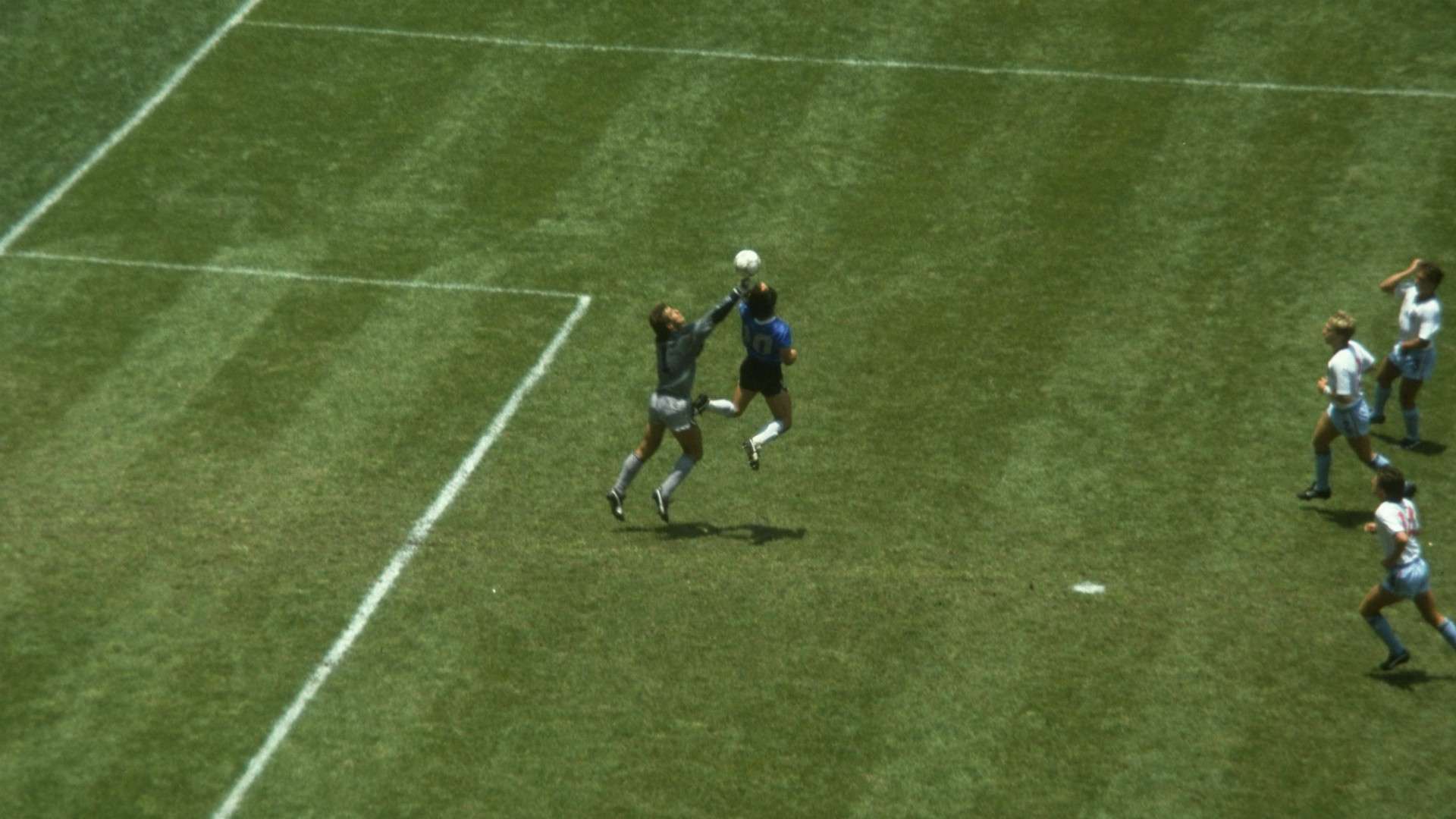 Getty Images
Getty ImagesAfter the match, when TV replays and photographs had clearly established that Maradona had handled the ball, the scorer gave his first goal its famous name by commenting that it had gone in "a little with the head of Maradona and a little with the hand of God".
He added later: "I was waiting for my teammates to embrace me, and no one came... I told them, 'Come hug me, or the referee isn't going to allow it.'"
Bin Nasser and Dotchev blamed each other. "I was waiting for Dotchev to give me a hint of what exactly happened but he didn’t signal for a handball," Bin Nasser said years later. "And the instructions FIFA gave us before the game were clear - if a colleague was in a better position than mine, I should respect his view."
"Although I felt immediately there was something irregular, back in that time FIFA didn’t allow the assistants to discuss the decisions with the referee," said Dotchev, whose account was marked with xenophobia on more than one occasion. "If FIFA had put a referee from Europe in charge of such an important game, Maradona's first goal would have been disallowed."
England manager Bobby Robson was more certain about what he saw. "I saw the ball in the air and Maradona going for it," said Robson. "Shilton went for it as well but Maradona handled the ball into the net. You don't expect decisions like that at World Cup level."
Even Robson, however, could have no complaints about the second. "A brilliant goal," he added. "I didn't like it but I had to admire it."
Argentina win the 1986 World Cup
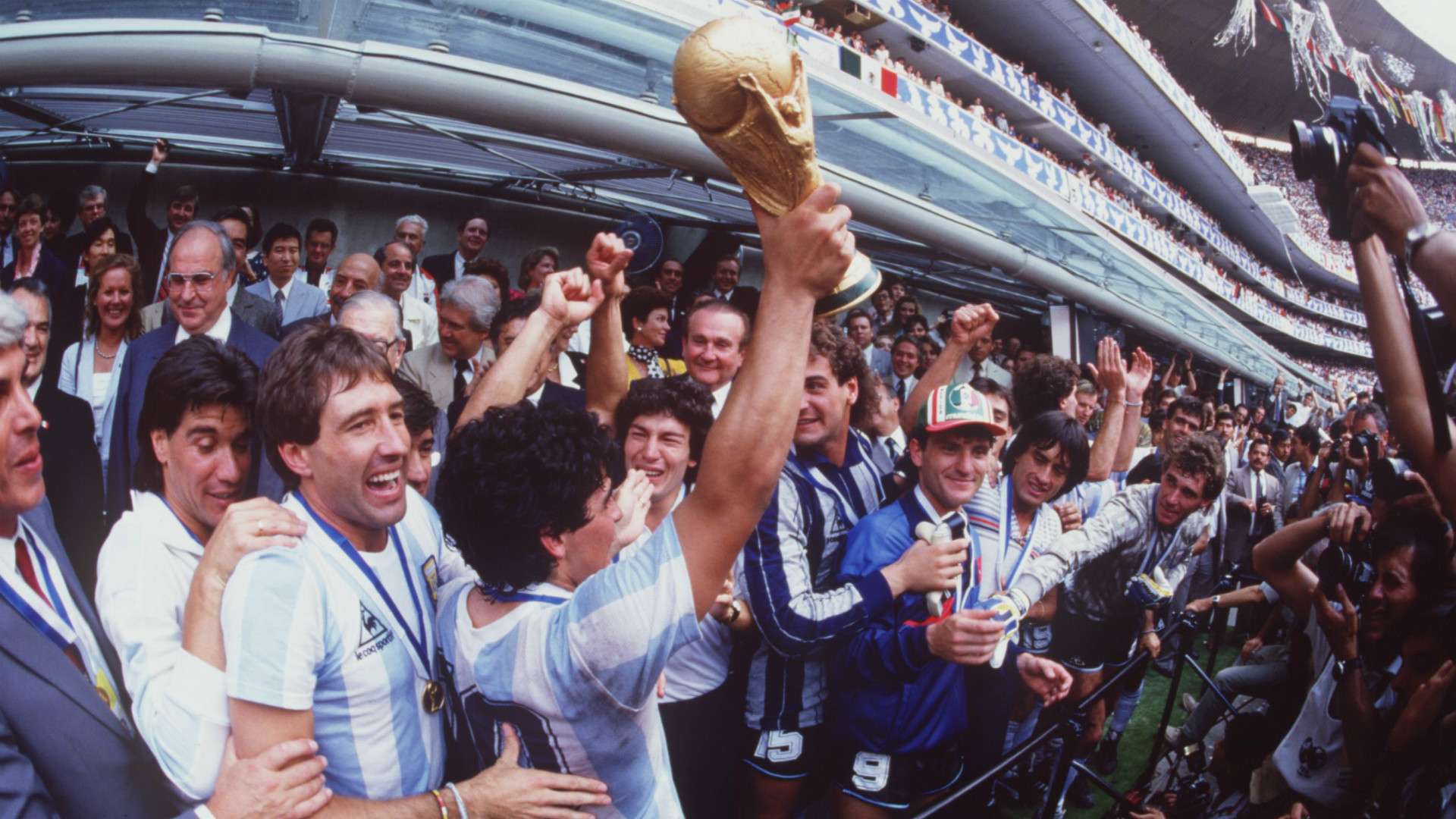 Getty Images
Getty ImagesAfter a match like that, Argentina had to go all the way. Maradona scored twice to secure a 2-0 win over Belgium in the semi-finals and West Germany beat France by the same margin to book their first trip to the Estadio Azteca of the tournament.
The Germany coach, Franz Beckenbauer, set Lothar Matthaus to man mark Maradona and on the surface, it appeared to work - having scored all four of his team's goals in the quarter-finals and semi-finals, Maradona was held off the scoresheet. His influence, though, was still felt.
First, he won the free-kick from which Jose Luis Brown headed home to give the South Americans the lead. Shortly after half-time, he played a part in the move which led to Valdano making it 2-0 at the end of a quick break upfield.
West Germany were a stubborn, hardworking team, however, and seemed to have salvaged extra time through goals from Karl-Heinz Rummenigge and Rudi Voller, both from left-sided corners.
But Maradona was not quite done. With six minutes to play, he opened his body up to receive a bouncing ball with three German players surrounding him and spotted the run of Jorge Burruchaga, who sprinted away from Hans-Peter Briegel and slotted past Harald Schumacher in goal. Argentina were world champions again.
